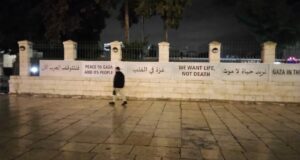By Amira Hass for Haaretz
Until Enaya Samara, who has been living in forced exile for the past eight months returns to her village near Ramallah, and until Someida Abbas, who was banished from his home 10 months ago accompanies his children to kindergarten again, it will not be possible to believe the defense establishment’s promise to change its policy. So long as American, Brazilian and German citizens whose name is not Cohen but Abdullah, are refused entry at the borders, we will know that the policy is still in effect – the policy of causing tens of thousands of Palestinian families to break up, or to leave their homes and emigrate. This is not a new policy in the West Bank and Gaza Strip. Since 1967, Israel has been carrying out demographic manipulations which should actually be called expulsion. Military edicts have caused some 100,000 people to lose their status as permanent residents in the occupied territories and to remain exiles in the countries to which they went to study or work. These manipulations have turned 240,000 people who were born in the West bank and Gaza and left the territories because of the 1967 war, and another 60,000 who were abroad when it broke out, to become new refugees.
All of them left behind families in the territories, but Israel prevented the vast majority from reuniting again in their homeland. (During those years, Israel was actively promoting the right of Jews in the USSR to emigrate and reunite with their families in Israel). After 1994, Israel made it possible for several thousand Palestinian families to unite every year; in other words, it granted their children the status of permanent residency. But the quota it fixed was always less than the real needs, and since 2001, Israel has even frozen the family unification process and barred Palestinians who are citizens of Arab countries (particularly Jordan and Egypt) from coming to visit.
Until 2006, Palestinians with Western citizenship (Europeans and Americans) were able to avoid this comprehensive policy. In the 1990s, they were considered a welcome population (investors, businessmen, academics working in international organizations such as the World Bank). Even if most of them did not get permanent residency, Israel permitted them to live here and visit regularly. This was also the case with Western spouses of Palestinian residents. Until someone in the political echelons decided that this “positive discrimination” (as opposed to citizens of Jordan and Egypt) was intolerable. And from the start of 2006 their entry has been blocked.
It is not clear who the decision-maker is. The coordinator of government activities in the territories told Western diplomats it was the Interior Ministry that made the decision. Interior Ministry officials say it was a joint decision with the Defense Ministry.
Be that as it may, whoever made the decision did not take into account that this was a blow to the strongest circles among the Palestinians – those who speak English, have access to the U.S. State Department, to important journalists, and to the Israeli and international business worlds. They found a way to get together and protest, unlike the tens of thousands of women who have Jordanian citizenship and hide in fear in the West Bank because Israel does not recognize their right to live with their husbands and children.
The change of policy toward Palestinians with Western citizenship was brought to the attention of MK Ephraim Sneh even before he became deputy defense minister. Already then, Sneh was of the opinion that there was no point in changing the policy and that doing so would be harmful to Israel’s interests. In a conversation with Haaretz, he sounded sincere in promising that this policy toward the Americans and Europeans had been canceled and that his bureau was working on new regulations that would “make things simpler rather than making them more complicated, and would alleviate rather than aggravate” the situation. (However, it was possible to understand from this that the regulations would not legalize the stay of thousands, particularly adults and children who remained even though their visas were no longer valid).
But the joy is premature: During the past two weeks, officials continued to prevent the entry even of those who are married and have children here and those who came on a visit. Are these merely “left-overs of the previous situation,” as Sneh put it, or does it testify also to the fact that Sneh is not the sole decision-maker, as was evident with his position on removing the roadblocks?
On the Israeli scene, army commanders (some of them settlers) act together with politicians, jurists and academics who are terrified of the demographic balance. The Green Line does not exist for them. They thought up the Citizenship Law, which crassly expanded the discrimination against Israeli Arabs and intervenes in their right to have a family life. Why do they not act the same across the Green Line where the military edict is in force? And if Sneh ceases being deputy defense minister, who can guarantee that a deputy from the Kadima party will not cancel the cancelation?
More than ever before, the Israeli system today denies the fact that it is repression and discrimination, an integral part of every occupation, that create the security threat. The most it is prepared to do is make “improvements” and mete out “favors,” but it will not recognize rights.
 International Solidarity Movement Nonviolence. Justice. Freedom.
International Solidarity Movement Nonviolence. Justice. Freedom.


